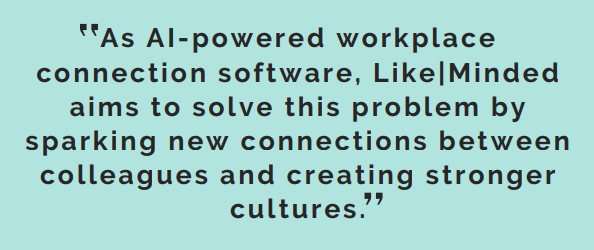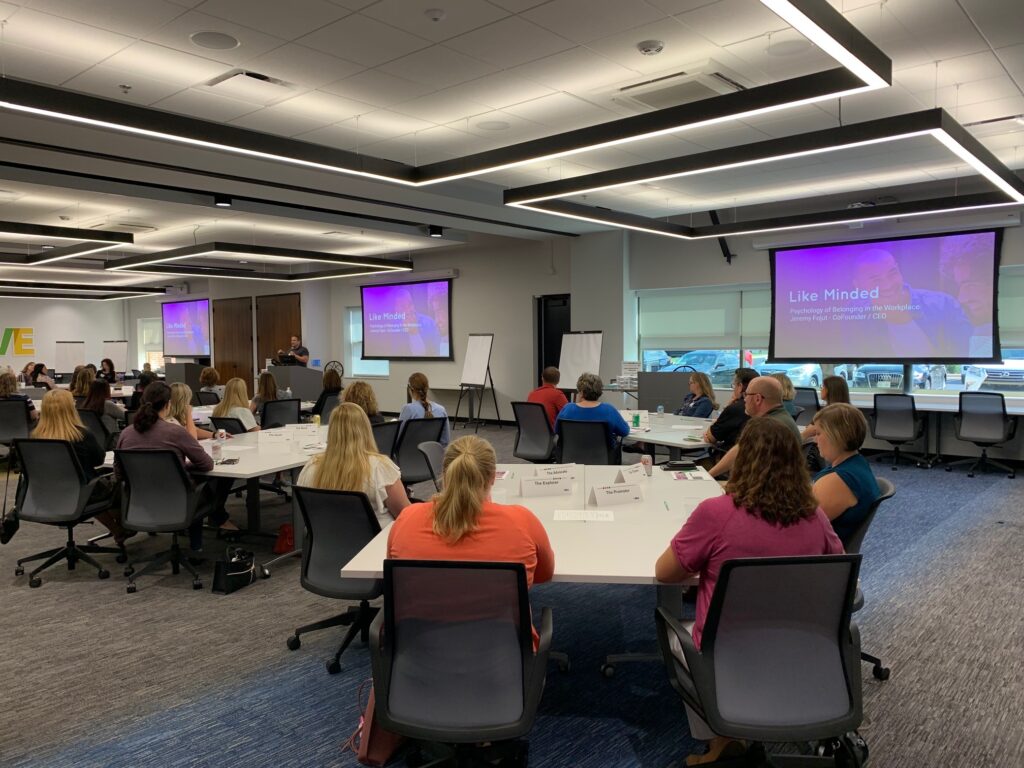Did you know that on average, when someone gets married they lose an average of 3 of their closest friends? According to Like|Minded Co-Founder Jeremy Fojut, as you change and move into new life stages including a new career, marriage, or having kids, statistically we lose friends. Even further, we tend to change our friend group by 48% every 7 years. As “AI-powered workplace connection software,” Like|Minded aims to solve this problem by, “sparking new connections between colleagues and creating stronger cultures.”
Since we spend such a large part of each day at our place of work, starting here seemed like the best solution to bring in quality over quantity friendships that are not as transactional and are based on the individuals within.

First starting the company Newaukee, Fojut was driven by people, passion, and purpose, hosting networking events throughout Wisconsin. He started seeing patterns of how and why people connect. Although he was creating events at a civic level, it wasn’t scalable across the world. Especially since the pandemic, something was triggered, where it was known that everything as we know it would change on some level, from how we work to where we connect. Loneliness became even more evident as in person events were canceled and personal transactions moved to only digital platforms.
Since the pandemic, 68% of individuals in western cultures feel socially isolated or lonely. The lack of in person interactions increased this problem. Statistically, it takes 50 hours of interaction to turn someone into an acquaintance and 100 hours into a friend…and that’s only for in person hours, not digital interactions. The digital count could be even higher. With the digital age we are more connected than ever, but less connected to each other. Additionally we are overall more anxious, and lonely, and not just from technology but from the erosion of institutions according to Fojut. In relation to the effectiveness of in person interactions, studies have shown that 80% of our considered best friends are within 7 years of our age and live within a 7 mile radius. According to Fojut, due to the fact that connectedness is based on repetition and frequent interactions, if individuals lived in a specific area there would be many micro interactions in an eco chamber. Even people that live in cul de sacs are less lonely than those that do not because they can see each other regularly. Digital systems and delivery options lessen the possibility of many micro interactions.

Fojut stated, “Connection is a currency, the more social capital they have, the more they will grow and belong. It’s important to authentically connect instead of in transactional or large quantities of individuals. This can create anxiety and disengagement, as more choice isn’t always the best choice.”
Like|Minded uses algorithms and artificial intelligence to connect others to form lasting relationships. Forming these connections encourages individuals to get people out of their bubbles. Unexpectedly, interests play no part in the connection. Just because two individuals may like the same interest, that doesn’t guarantee that they’ll form a connection. The focus is more around personality and current stage in life. Like|Minded also uses people analytics to help employers understand what employees want and what motivates them based on personal values and interests. The program also helps them identify “Super Connectors” and “Innovators” within the company who naturally seek out interaction and positive change, to create meaningful connections between fellow employees. Like|Minded focuses on creating diverse teams “that lead to diverse thinking and progress.”
All of the research and testing, zoom calls, in person testing, and AI creates a deeper understanding of how personalities are measured by extremes and is based on how we are feeling. There are 6 personality types and prediction measures used for the programmatic matching, a 6 month onboarding program, and user manual on how to make connections. The program even sends more information on how you can connect to yourself better.
In the first 60 days, individuals are encouraged to connect with a certain number of people, including connecting for coffee or at an event outside of the company. Before meeting, individuals are given icebreakers and information on how each person likes to be communicated with in the form of a tool. Fojut found that people who receive this information on how to communicate with each other based on personality assessments, talk 30 minutes longer than those who do not. Since there are different types of communication styles, this helps identify what topics of conversation are best or relatable, and interesting for the other person.
Like|Minded aims to help solve social isolation and loneliness to ”help deliver happiness” for the future. Some of the individuals who met through this service have become roommates, been in each other’s weddings, and even started businesses together. Fojut shared, “It’s important to connect with people to have a happier life-outcome, to help people become happy and share memories and experiences.”
To view the entire issue of Person & Planet where this article is featured, you can find the digital version here and the print on demand version here.
-Stephanie Krubsack

